“I’m imagining the first spots of awareness as little murmurs running through the universe, wondering “What’s going on?” as it moves and feels through the dark. Then the sound multiplies from microorganisms into ecosystems and entire civilizations and religions, rising and falling as the clamouring to know “What’s going on?!” reaches a crescendo.
The answer? This. This is what’s been going on.”
Welcome back to Wonderland.
This series explores philosophy and political theory from first principles. Please start from the beginning to follow along with the story.
Today we will be exploring consciousness. What it is, why we have it, and what we can do with it. The questions posed by our sense of subjective awareness have occupied religions, philosophers, and psychologists for centuries. And the answers we accept determine our relationship with our world, our lives, and our selves.
How does all the richness of experience arise out of inert matter? How does this elusive sense of “I” come to dominate our inner world? And how can one enact meaningful change in the conditions of their consciousness? Is such change even possible? Or are our minds predestined to predictable ends?
To start our journey, let’s return to where we left off in Wonderland…
Wonderland is a free publication that outlines a philosophy and political vision for the 21st century. To support my work and receive updates on new posts, sign up for a free or paid subscription.
Chapter One: The Cat in the Library
The day after the trial you are awoken by a ray of light that pierces through your bedchamber. You squint your eyes and toss off your sheets, recognizing the familiar sound of scratching at the door. You open it to reveal a black cat, who eyes you for a moment before slinking down the castle hall, turning halfway down the corridor and giving you an expectant glance, indicating that you should follow.
The cat leads you to a set of double doors which open to reveal a large library. A spiral staircase in the centre of the room sinks deep into the ground and stretches high into the sky, allowing access to far more stories than you thought the castle could contain. The cat wanders down one of the many rows of shelves and you follow, dragging your fingers along the spines of the texts.
They all have strange names, titles that declare in all caps, “THE FIR TREE BY THE POND IN THE VALLEY”, “LUCKY PAIR OF SOCKS”, and “ANT HILLARY #4683”. The name of this final volume piques your interest and you pluck it off the shelf. Opening it to a random page reveals what seems like nonsense, a list of random words with no context. “Food. Light. Hot. Cold. Friend. Foe. Food. Food…”
The book next to it titled, “BLACKBERRY BUSH SOUTH OF THE STREAM” is similarly strange, with pages containing lists of chemical compounds and others detailing weather conditions that stretch on for decades. Almost every word in the body text has a complementary citation at the bottom of the page, referring the reader to additional books with the same bizarre names.
“What is this place?” You wonder aloud.
The cat rubs its spine against against a wooden bookshelf and curls around a corner, wandering deeper into the depths of the library.
“Wait up!” You call, sliding the books back into their spots on the shelf and chasing after it down the hall. But the cat is gone. Instead, you find a book lying forgotten on the floor, bold letters in gold print boasting it’s name: “THE CAT IN THE LIBRARY”.
Chapter Two: Sensemaking
When I think of consciousness I like to imagine what the first forms of awareness must have been like. A sensitivity to light most likely, made by some single-cell organism that writhed through the water, searching for a source of energy.
Life is defined by it’s anti-entropic character, the fact that it makes order out of chaos and weaves patterns out of what was once unpredictable. It may sound counter-intuitive at first, but a tree contains less information than the environment it emerges out of. The wind, soil, and sunshine are vastly more complex than the plants that they collaborate in creating.
Amidst this reorganization of reality, something new is born: a sense of relationship. There is now the entity and the environment. The entity relies upon the environment to survive; it must extract nutrients from the external world. The best way to do this successfully is by acquiring information about it. By having access to even rudimentary information about its surroundings, an entity can react and adapt accordingly.
This is what a sense is. Senses provide living beings with knowledge of the outside world. When a sapling grows towards the sunshine, or a mushroom glows at night, or an ant picks up a crumb of gingerbread, these organisms are acquiring information about and interacting with their environment.
Senses allow living beings to make decisions. The external input an entity receives will determine what it does and why. Starve a plant of sunlight and watch it grow in a new direction. This behaviour is not automatic but motivated by clear drives and desires, a cybernetic process that brings a system in closer alignment with its goals.
The question as to how the material facts of reality are transformed into the realm of sensory experience is referred to as the hard problem of consciousness. How organic information-processing systems generate subjective awareness of phenomena, also known as qualia, is a topic of much debate.
The issue with the hard problem is that it attempts to flatten the richness of reality into a purely scientific, material understanding of the world. Science can be a useful tool for exploring our environment, but our sense-making abilities suffer when we mistake the map for the territory. Our lived experience cannot be shoe-horned into and analyzed by scientific methodologies, for something essential is lost in the process. Qualia is an emergent phenomena, which cannot be found in any individual atom or examined under a microscope, but that doesn’t make it any less real.
Some philosophers have suggested panpsychism as a solution to the hard problem, which posits that consciousness must be an innate property of matter. Under this view, it is believed that even inert objects, such as a cup of coffee, may have some subjective experience. I believe this is an oversimplification, which recognizes the latent energy potential in all things and then overgeneralizes the capacity for subjective awareness.
Organic life is different from rocks or waves or wind because it has a natural start and end. A tree or beetle is unique in that it is very clearly this and not that. The entity acts as a distinct unit of information that must act to ensure its survival. To do this, it must develop an internal representation of the outside world. It is through this process, this interaction between organism and environment, that the experience of being is born.
Consciousness, in my opinion, is an emergent capacity of embodied energy. A sense of presence is a consequence of external information being internally represented. A subject is required to define the object. Thus, any steps taken towards empiricism will naturally beget a sort of subjectivity. As an entity evolves in complexity, the amount of information it contains about its environment increases. Each bit of new knowledge is then integrated into a more comprehensive whole. A system that can hold a more refined representation of the external world will be more successful, transforming latent energy into a field of awareness.
At what point between the fertilization of an egg and the delivery room does a baby become conscious? Does the light of awareness suddenly flicker on? Or is the process gradual, incremental like the rising sun?
I like to think of consciousness as a cone, containing a gradient of awareness that varies from primordial processes to complex experiences. Microbes and Mosquitos are essentially automatons, acting out pre-programmed instincts without any sense of self or need for nuance. Information is acquired and reactions follow. An insect can likely discern light from dark and food from threat, but it lacks the internal hardware necessary to store memories or infer causal relationships. Its experience is confined to the immediate, it cannot conceptualize that which is not; it simply is.
Plants have a similar sense of present awareness. They know what time of day it is, where they are, if they are being touched, and what surrounds them. They possess sight, in that they can detect and react to electromagnetic waves. They grow towards blue light and measure the time of day through red light. They can also store this information, allowing them to track seasons and recall the types of light they were recently exposed to.
Plants can smell, in that they detect chemical signals emitted by their neighbours. They know what kinds of plants are nearby and if they are ripe or under duress. Damaged leaves and trees attacked by insects will send signals to their neighbours, communicating that they are in danger and giving others time to defend themselves.
Plants also know when they are being touched. They can differentiate temperature and pressure through the same electrical signals that animals use. Some plants will react when touched, like a Venus Flytrap snapping shut, or a Mimosa Pudica pulling in its leaves. However this does not imply that plants can feel pain. Pain is an adaptive signal that is only effective when an organism can remove itself from a dangerous situation. As plants have no means of escaping painful experiences, they would derive no benefit from the negative sensation.
It has been discovered that trees will share nutrients and communicate information through underground networks of Mycelium. Mother trees can recognize their offspring and will rearrange their roots in order to make room for them to grow. When trees bear fruit they do so concurrently across the country. Coordinated behaviour emerges out of mute, immovable entities through their ability to leverage sensory information and signals to their advantage.
Despite not having brains, I do believe plants possess an emergent awareness of their environment like all living beings. The quality of this experience will be different than it is for people, but it’s just as real. I imagine plants experience a thoughtless presence that must be similar to deep states of meditation. There is no sense of self or concern for what the future will bring, only the gentle hum of being in and of the world.
As creatures increase in size and complexity, their conscious capacity grows too. The neural circuits first found in jellyfish evolve into a spinal column which allows for the quick transfer of information to and from the brain. Early vertebrates such as reptiles, amphibians, and fish show little evidence of goal-oriented behaviour. They perceive reality and react instinctively, bypassing the need for abstract thought entirely.
Mammals such as rats, on the other hand, demonstrate adaptive intelligence. A rat raised in a fancy cage will solve mazes faster and develop a heavier brain than rats raised with no external stimulus. This suggests that an animal’s cognitive capacity is not fixed, but dependent upon the richness and challenges posed by its environment. A rabbit that spends its life living in a dark cage, surviving off of only the most basic necessities, is bound to have a more limited internal experience than a rabbit that is trained and cherished.
By giving our pets names, teaching them tricks, feeding them treats, and exposing them to new experiences, they develop a more nuanced representation of the world and subsequently a stronger sense of self. It is my firm belief that consciousness is malleable and can change over time as environmental pressures motivate novel modes of thought and forms of action. A raccoon raised in the city will find new uses for its opposable thumbs that its forest-dwelling counterparts never could have fathomed.
If instincts are enough then an animal will survive off of instinct alone, but when presented with the ability to exert meaningful influence over their environment, they will quickly rise to the occasion. The ability to recognize objects and infer causal relationships endows creatures with a certain degree of agency. They can make predictions about how their actions will influence the outside world and choose to do that which will bring them closer to their goals. When my cat comes to me and presents her belly for a rub, suddenly the mysteries of her inner world become all too clear; she would like a belly rub.
What my cat knows is a subject of much contemplation. Clearly she can identify when I am eating, for she will often come over and ask for a bite. But can she infer that the toilet provides the same function as her litter box? Based on smell alone I would venture to say yes. What about when I shower? Or go away for a weekend? Does she know that I am getting clean and coming back? Does she remember all the previous places she has lived and people she has known? Does she ever long to return to them?
She certainly knows how to wake me up in the morning. She knows when she has misbehaved and when the dreaded vacuum is coming out for its weekly clean. Some scientists suggest that ascribing emotions to make sense of animal behaviour is anthropomorphism, and should be avoided at all costs. But I think that nothing could be further from the truth. Projecting human thoughts and emotion onto animals is often the best first guess as to what they’re doing and why. My cat hides from the vacuum because she hates the loud noise, she scratches at my door in the morning because she wants to eat, and she looks into my eyes lovingly because she loves me.
Octopuses can recognize faces. Elephants can discern between the voices of hunters and explorers, and will only flee the former. Whales have been known to provide aid to humans and other animals who are in distress. Dolphins love to play and will imitate the behaviour of others. Primates can learn to communicate and use cellphones. Crows will solve puzzles and use tools to create games. Consciousness and cognitive capacity are not unique to Homo Sapiens, we are simply the most advanced iteration in a long line of living beings.
If awareness is an emergent property of energy, then is something like a real collective consciousness possible? Does the ant colony have a sense of being that is greater than the ants themselves? Do the cells and bacteria in your body influence your behaviour? Split-brain studies suggest that both hemispheres can be aware of information that the other is not, and will rationalize the behaviour of the opposing hemisphere to fit its own narrative. This opens up the possibility that there could be two minds existing inside of a single person. However, this hemispheric rivalry is still embodied in the same flesh-suit. The inputs and outputs may be split, but they are both receiving information from a continuous whole. I believe emergent awareness is only possible when there are physical structures cycling energy within a specific entity. Therefore a literal collective consciousness or distributed ant psyche is impossible; the embodied relationship between interior and exterior is too essential.
The rise of artificial intelligence poses similar questions about consciousness. Is it possible that a computer could ever come to have an internal sense of self and subjective experience that is analogous to our own? Given that I don’t think there is anything inherently special about organic biology, I do believe this is a possibility. But it will remain unlikely so long as the technology is housed inside of a distributed network. Just as the individual ants within a colony do not give way to a higher order “colony consciousness”, subjective awareness is not possible unless it is embodied. As long as artificial intelligence is “locked in” to a purely digital world, it will lack the contrast necessary to develop a sense of individual identity. Experience is a consequence of a personal relationship. It possesses a unique character that is distinct and evolves over time, being continually informed and updated by the outside world. Without this clear delineation between subject and object, no sense of self can grow.
In the literature on consciousness, there is a common disagreement on the precise meaning of the word. The first definition describes any state of subjective awareness, any mode of sensory experience that is distinct in that is has a certain character and not another. That is the definition I have assumed throughout this chapter. The second definition I believe is better described as “self-consciousness”, in that it refers to an observer who has turned in on themselves, and developed the capacity for self-reflection and metacognition. Thinking about thinking. The process of establishing a sense of “I”, or an ego, that dominates our relationship with the world. The ability to think abstractly, plan for the future, and reminisce about the past is only possible in this second category.
When one is put under anesthesia, they are rendered unconscious. They have no awareness of themselves or their surroundings. A person can also be unconscious of automated actions, such as driving a car or riding a bike. These motor tasks are routinized to the point that they require little thought or active attention. When a person is in deep meditation, they are conscious but they are not self-conscious. Whatever thought patterns that dominate their daily life are shed in favour of a magnified focus on the energy within. Slowly, the sense of interior and exterior that defines our subjective experience starts to dissolve, until only the energy remains.
Chapter Three: The Story of Your Life
You hesitate before bending down to pick up the book with the black cat on its cover and flip through the pages. Inside are little chapters that describe the ebbs and flows of feline life. The footnotes citing “THE DORMOUSE IN THE DUMBWAITER” and “THE AFTERNOON PATCH OF SUN IN THE GREAT HALL” as key players.
Curious, you flip to the back of the book and look at the last page. The entry starts by describing the morning you just had—a scratching at the door followed by leading the visitor into the library, winding through the bookshelves until... The story stops.
“I see you found the library of your life,” says the Princess. You whirl around to see Her Royal Highness standing before you, wearing a white gown and ruby slippers.
“My life?” You ask. “But these books have nothing to do with me!”
“Oh sure they do. You’re here, aren’t you?” She asks, pointing to copy of “THE CAT IN THE LIBRARY” still clenched in your hands.
“You can put him down now, by the way.” She adds, as the hardcover collapses back into the shape of a black cat. You drop it in surprise and the black tom leaps into the awaiting arms of the Princess, purring and licking her affectionately.
“How is that possible?” You ask, astonished.
“Well, you can’t exactly expect him to be in two places at once, now can you?” The girl replies, stroking the cat lovingly behind the ears.
“I told you that we need to look into your mind. Well, this is it. All of the stories that make you, you.”
“But I’ve never met that cat before!” You insist.
“Once is enough,” says the Princess, dropping the black cat back down on the floor. “Somewhere in this library is the story of your life. Find it, and we’ll have a clue as to who you really are.”
“Right. Okay. And how do I know where to look?”
The girl shrugs. “You’ll know it when you see it. The right book will call to you.”
You gaze around the gigantic library, it could take days to get through it all and you don’t even know what you’re looking for.
Suddenly, the cat lets out a meow from a few aisles over and you go to discover what’s caught its attention. The black tom is sitting, tail swishing back and forth, looking up at a bookshelf. You follow its gaze and lock eyes with a copy of “WONDERLAND”, a fat text with gold lettering and a green tree embossed on the spine.
Sliding it off of the shelf you can feel your heart palpitate, and you gingerly peel open the first page. It reads: “Chapter One: The Maze”.
Chapter Four: A Twinkle in Your “I”
In the famous words of Douglas Hofstadter, “I am a strange loop.” Or rather, “I” is a strange loop. Where the subject of the self is concerned, subject and object become rather fickle categories.
By “strange loop”, Hofstadter is referring to a feedback mechanism wherein a system turns inwards and starts to generate internal representations of itself. No longer is only the environment being perceived, but the entity who acts within it becomes a meaningful part of the picture. The influence of the agent, and by inference, the nature of the agent begins to be abstracted and conceptually contended with.
An infant confronting a mirror quickly learns that they too have an avatar with which they walk through the world. In the first 18 months of life, a baby will string together sensations, actions, and reactions into a consistent self-concept. They learn that some behaviours are praised while others are punished, and will tend to do more of that which gains them encouragement. Subsequently, two competing senses of self are born; the rational Ego and the temperamental Id it must learn to control.
This mind-body split encourages feelings of shame, guilt, and judgement while also evoking pride and self-esteem when the ego is properly obeyed. By generating this dialectic between reason and desire, the former can hone the latter and guide it down more difficult paths. Notions of delayed gratification, sacrifice, and compromise are only possible once an agent can put distance between themselves and their desires.
The sense of self that sits so near to our spirit is an epiphenomenon; an emergent capacity of consciousness that has tangible effects without a clear first cause. Hofstadter illustrates this idea by describing a pack of envelopes he discovered which, when pinched, revealed a marble hidden at the centre of the stationary. However, upon further inspection, the marble was nowhere to be found. Only a stack of letters which, when clenched together, created the illusion of a marble by virtue of the bit of glue and layered paper that give the envelops their shape. The cumulative effects of this bit of bulk creating the distinct feeling of something hard and certain at their very centre. Sound familiar?
Unlike the marble metaphor, however, our sense of self is continually informed-by and updated in relation to our external environment. A child praised for their intelligence will likely work harder at school, while a kid that suffers from shyness will struggle to make more friends. The narratives we come to accept about ourselves will have a direct influence on our actions and attitudes, creating a self-reinforcing feedback loop.
“I” can be imagined as a drop in a pool of calm water. The ripples that emanate outward generating a picture of the world, like a bat using sonar. As the waves hit the edge of the water they will bounce back to their source, bringing new information about the shape of the space. The signals that are reflected back to us will then go on to inform our self-image, influencing how we behave in the future.
When we refer to “I” we imply something that is in, but not of the body. Our bodies are tools that we use to further our ends, but they are not ends in and of themselves, otherwise what would we be doing here? If the evolutionary M.O. to survive and procreate was purely material, then why would our minds be so malleable? Instinct is a valuable tool in that it leaves little room for user error. Automated action is certainly more reliable, so where’s the utility in uncertainty?
“I” is the domain of causal potential. It represents the locus of agency within a given entity. In order to make decisions, a being must be able to consider and compare potential outcomes and use their judgement to come to a conclusion. The advantage this provides is the ability to be more adaptive. No longer are we anchored to the slow march of evolutionary biology. Within a single lifetime a person can explore, select, and share what they discover, side-stepping the need for random mutation in favour of intentional experimentation and implementation.
By possessing an identity that can integrate information and think abstractly, more nuanced behaviour becomes possible. “I” is a computational field where sensory data comes to dance and is transformed into thought and emotion. Pure experience is value-free, it must be assimilated into a network of identity and desire before it can bear meaning. Without self-consciousness, our actions would remain limited and impulsive; instinctual. It is only with the addition of an “I” that we enter into the realm of ego and ideas, a place where the soul is greater than the hum of its parts1.
A work of art “breaks the fourth wall” by acknowledging its own artifice. When something begins to talk about itself it shatters the barrier between performance and audience. Self-consciousness is this sort of violation. We become aware of our beliefs and biases, the role we play in getting in our own way, and the endless swirl of potential that surrounds us. Cognizance of the stories we tell ourselves allows us to question their foundations and challenge our self-imposed limitations.
Reflecting requires thinking about thinking, providing depth and substance to what would otherwise be a pretty shallow existence. In our mind’s eye we can play with hypotheticals and explore counterfactuals, creating a powerful tool to contend with reality and our relationship to the world. Our minds are flexible representational systems that know no bounds in terms of what categories can be considered. We are Turing-complete, in that there is no upper limit to our computational capacity—the ability to manipulate data and symbols is an endlessly recursive process.
The primary way we manipulate concepts is through language. Speech evolved as an information sharing mechanism, allowing people to communicate needs or dangers to their tribe. Since then, language has grown to dominate every aspect of our day-to-day lives. From childhood we are taught what colours we can see and what emotions we can feel. The utility of words is a double-edged sword, in that whatever they specify they also separate. By gaining the ability to communicate more complexly, we forget the ways in which things are connected and identities are slippery.
As Daniel Dennett says, “language lays down the tracks on which thought can travel”. Without words we would have no way to make concrete the abstract, or give form to the formless. Our inner monologue drives a narrative that creates a static sense of identity, meaning, and purpose. People who grew up without language and only acquired it later in life claim to have no memory of their lives beforehand. Without words to anchor our experience, awareness becomes egoless and transient.
Who “you” are is an enduring pattern of motion, like a whirlpool, rather than an enduring substance. You consists of the memories, thoughts, and stories you tell yourself about who you are, the inner narrator acting as a constant reminder of the role which you’ve adopted. The material substance of our lives plays second fiddle to the arena in which the drama is acted out. The nature of the mind cannot be reduced to brain tissue and neurotransmitters, for that is the set upon which the actors come alive. Ideas, be they dreads or dreams, are what engage the mind and set the story in motion. The tale is not the typeface, but the story and the teller are one and the same.
If time is the fourth dimension, then I like to imagine causality as the fifth. Time sets the mechanics of the material world in motion, but causality determines how they unfold. The relationships between objects are just as real, if not more real than the things themselves. For the objects are temporary, but the dynamics that regulate their interactions are eternal.
Your sense of self emerges from patterns that play out in your mind, not the lump of meat inside your head. Signals that bounce between neurons aren’t what make decisions, the ideas they represent do. In this world of upside-down influence, meaning starts to matter more than the matter itself, for meaning is what motivates us to move it. The bottom-up processes that first transformed inert molecules into organic life start to invert, as the material world is slowly reshaped by life itself. Political uprisings and world wars cannot be explained in terms of particle physics, for clearly they are the natural consequence of certain ideas and beliefs interacting.
As Carl Jung observed: “People don’t have ideas, ideas have people.” The causal potency of an idea or ideal is just as real as molecules and mathematics. All of human history can be understood as a battleground of varying values and social systems. The champions of any particular cause will rally others, inspiring them through a sense of awe and obligation. The American Dream, The Protestant Ethic, and The Communist Manifesto all carry real water in the world, and drive men to do things they otherwise would not have thought possible.
The attitudes and ideas we accept have material consequences in our lives. A society obsessed with mental health will invariably beget more mental illness, as this is where the social focus has shifted. What you look at grows. So one ought to exercise caution when deciding where to put their attention. Ruminating upon any affliction of the mind is bound to beget a negative feedback loop, where symptoms worsen precisely because they are being attended to. Even seemingly superficial things, such as saying, “I am anxious” rather than, “I am feeling anxious” will build up and start to impact your self-esteem over time. Shedding static labels in favour of transient descriptors frees your mind from artificial limits imposed on its potential.
None of us live in an objective world, but instead a subjective one that we have given meaning to. We are not determined by our experiences, but the meaning we give them is self-determining. We are not stones, we are beings capable of resisting inclination. We can stop our tumbling selves and climb uphill2. Our will emerges out of, yet is separate from and able to influence the environment to serve specific ends. This is the premise of all great religions: that radical self-transformation is not only possible, but the key to a meaningful and fulfilling life. When someone truly grasps this knowledge and applies it, a world of possibility opens up to them.
To “sin” means to miss the mark, to fail at accomplishing the task set before you. In this sense, man sins whenever he evades the responsibility of taking power over his own life. Not doing what you know you should be doing by allowing external forces or internal whims to shove you around is missing the mark. Letting the world hold too much power over you refuses the divine call that tugs at each man’s soul. Only you are capable of altering your conditioning and charting a new path of your own making.
The more aware and attuned you become in your own life, the more you clean up your influence on the collective. Accepting your power as master of your own domain allows you to step into the role with confidence and clarity. This organically improves the conditions of those around you, for a firm and kind presence is contagious. It is only through changing yourself that you can start to change the world.
Chapter Five: Rewrite
“Uh, Princess Muza?” You call. “I think I found my book.” You clench the copy of WONDERLAND, reluctant to read any further.
The Princess appears by your side and extends her hand, taking the book and looking through it until she finds the right page. “Here you are,” she says, handing the open book back to you.
The text reads: “Here you are,” she says, handing the open book back to you. The rest of the page is blank. In fact, the rest of the book is blank, and it still has a good quarter to go.
“What do I do now?” You ask, half expecting the words to appear on the page.
“Well, what do you want to happen next?” Replies the girl as she gives you a pen.
“What do you mean, what do I want? I thought we were finding out who I am! This book doesn’t bring me any closer, it only says what I already know. Creepy, though.”
“You mean, who you were before Wonderland? I thought that was obvious by now. The reason you can’t remember who you are is because you didn’t exist before you came here. You’re a character in someone else’s story. That’s why you keep doing things against your will, you’re at the mercy of their strings.”
“Although, I guess,” adds the girl. “The author must equally be at the mercy of yours. A strong enough story is funny that way, suddenly you spend sleepless nights and weeks working, trying to create something that winds up creating you.”
You aren’t listening. Your ears are ringing. Brandishing the pen like a knife you scrawl sideways across the page: I ESCAPE.
Chapter Six: How to Change Your Mind
Religious philosopher Maurice Nicoll writes that the Biblical notion of repentance is actually a mistranslation of the Greek word metanoia, which means change of mind. This understanding brings a whole new meaning to much of the New Testament, wherein the primary message of Christ is that of psychological transformation. This change of spirit cannot be reached by outer compulsion. Rather, it is the internal and eternal task of every man to turn in unto themselves and undergo this radical rebirth.
The path to enlightenment leads away from all safety and shelter. One must be willing to abandon their creature comforts and venture out into the land of the unknown. The pleasure you derive from security in your personhood must be sacrificed in favour of all the things which you are not, but have the potential to become. Clutching too tightly to your sense of self renders real changes of the spirit impossible, for one is too preoccupied with preexisting patterns to start to see the forest from the trees.
All religions are solvents for the sorrows of the disordered soul. They share one common theme, which is that man is a creature with the capacity to occupy higher states of being and awareness. Christ likens man to a mustard seed, who cannot grow by the light of the natural world alone3. To climb into the Kingdom of Heaven, one must look beyond the material and engage instead with matters of the spirit. To have faith is to maintain a certain openness to the world and your role within it. It is an act of trust in the unknown, a curious constant that allows one to remain both dynamic and vulnerable, ready to receive whatever it is that life has to offer.
As Alan Watts says, “to idolize scripture is like eating paper currency.” And as Christ said, “the sabbath was made for man, and not man for the sabbath.” Both of these statements share the same underlying theme: that the symbol should not be mistaken for the thing it is meant to represent. Religious doctrine are intended to serve man, and no man ever attained metanoia through unexamined service. Because the essence of spiritual practice cannot easily be pointed to, prophets and scholars are forced to speak of it through myth and metaphor. But as was said before, one must not mistake the map for the floor. For the terrain we navigate is unending and constantly shifting.
Truth is sensational. Whatever a person feels it is right to do is, for them, the truth. Until someone personally experiences something, they have no real knowledge of it. The colour red or taste of caviar or smell of blood are not facts, they are experiences. Thus, until a person has the proper experience, they will remain unmoved in matters of the spirit. For knowledge must become emotional in order to affect us. Unless you can understand and apply religious teachings, they will remain intellectual curiosities rather than empirical realities. Here, I am a hypocrite, for although I appreciate the mysteries of meditation and the similes of scripture, I am still young and spiritually inexperienced. However, this doesn’t suggest that I don’t know where to look.
Meditation, either through prayer or breath-work, is a religious universal. Any form of prolonged concentration focuses your attention so that attention becomes intention. To attend is to notice, and to notice is to discern. Everything has a certain character that gives it a particular quality. By attending to our experience, we become more aware of both our environments and ourselves. Within this new cognizance, new knowledge and possibilities reveal themselves.
To meditate successfully, one must create space within the psyche; a spot of internal awareness that is neither subject nor object. To hold the ego aside long enough to glance inward is a difficult task, for the self is dominated by internal chatter. However, with practice one can learn to quiet their inner narrator and dissect their souls from their selves. This process cannot be forced or fast-tracked, for self-consciousness cannot be shed through a heightened focus on the self. Only by making room and allowing things to happen within the mind will a strange new light begin to shine.
Enlightenment is not the creation of a new state of affairs, but the recognition of what already is. The concepts and abstractions that are necessary for our survival also bring us further away from the realm of raw experience. Your true essence is pure, dynamic presence. No solid core sits at your centre; there is no marble of the mind. All that exists is a pulse, a rhythm of energy that beats continuously. When we gaze directly at this source of inner light, all experience is bathed in warmth, depth, and meaning.
Everything becomes fresh and new, untouched and unspoiled by previous explorers. The feelings of peace, love, and connection that you have sought for so long start to radiate through you, gushing from an endless source of plenty. You remember that this is the sensation you have always known and never had the strength to remember. The secret yearning behind our searching, incomplete lives that physical pleasures try to satiate but never truly satisfy.
The light of consciousness shines through all of us. The same spark of life that electrifies trees and honeybees is ours too to share in. We do not come into the world but out of it, weaved from of the same pattern of energy that reverberates throughout the entire solar system. Our sense of awareness is like an antenna, tuned in to a universal field of experience accessed by our individual psyche. The quality of the signal we pick up on depends entirely on our state of mind.
You are not who you think you are.
If consciousness is a light, then your mind is like a film projector, playing the story of your life as a tape that flickers through your awareness. Everything printed on the film is a kind of shadow, that blocks or distorts the light in some way in order to cast an image. Without the shadow there would only be shining, pure light with no shape. Every spiritual practice on earth is designed to stimulate our recognition that this holographic projection is happening4. The secret they reveal is that the light, the shadow, and the screen are all the same.
Hindu wisdom says that the whole universe is just God playing elaborate rounds of hide and seek with itself. By pretending to be you and I, it gets to go on wonderful adventures, with plots so intriguing that it quickly forgets it is playing a game. Discovering this truth too soon spoils the fun, so it must divorce itself from the knowledge that it is one. The stakes are all for show, and the opera is just a play, but the theatrics provide some zest and spice to an otherwise eternal ordeal.
If the apple of your “I” was to have a core, it would be this: there is a spark of divinity that runs through you. God is the witness, the mind of the universe. He is as close to us as we can bear being to our true selves, living each of our lives lapping up the luxury of exquisite experience. It is not you who live, but God who lives through you, soaking up sensations like a sponge. Knowing this, developing a relationship with the divine becomes simple. It is not about seeking and serving something external, but instead cultivating and attending to the bit of the Lord that lurks within.
Everything can be understood as a single flow of energy, a complex pattern that moves and shifts over time while maintaining a certain character. All events are interrelated, mutually entangled and evoking one another. Bottom-up and top-down dichotomies overlook the greater unity that is only accessed when parts are considered as a whole. The illusion of identity convinces you that you are separate rather than the same. But differentiation is not separation, it is the knife with which we can known the world.
Your field of awareness is like glass. You are edges, nothing aside from the things that give you your shape. Our senses fill us with what is external, so what we are is the context in which our lives transpire. Trying to describe your Self from your experience is like trying explain the colour of a mirror in terms of the image it reflects. The ego is incidental, one of a thousand focal points through which the universe watches itself.
It can be fun to don a mask and put on a show, but be careful not to get too caught up in the character. We tend to become so enmeshed in the drama of our personal lives that we forget our fundamental nature, One that is abundant and divine. We grow so attached to our identities as separate and lacking, and get suspicious of the suggestion that we may in fact be whole, and wondrous. Pain turns into suffering when we start to take it personally, as if it reflects something uniquely meaningful or bad about us5.
Suffering and desire are two sides of the same coin. We want, so we can strive, so we can fail, so we can feel, so we can pick ourselves up and start the cycle all over again. The soul longs to evolve, so it creates circumstances where it can stretch and grow, expanding its horizon of potential experience. Without suffering there would be no call towards self-actualization, no struggle through which we can come to know the full range of human ambition and emotion. The divine within us is innately curious about all that life has to offer, both the good and the bad. By accepting pleasure and pain as part of the package, that cosmic itch is scratched.
Blaming circumstances for your discontent is a surefire way to repeat the pattern. Negative projection is one of the main mechanisms of the mind, creating the illusion that the problem with our lives lies “out there” rather than “in here”. Of course, people suffer for reasons that are not their own, but the extent to which they suffer is. When you stop taking life personally, your heart becomes light and your spirit soars. Untethered from expectations of how things should be, you can appreciate life as it is.
The shadowy, subconscious part of your self yearns for a taste of darkness. Until this inclination is brought into the light, it will rule your life and you will call it fate. Only by surrendering to suffering and relishing in the richness of feeling can painful experiences truly be processed and moved past. Leaning in to negative emotions with total authenticity and approval allows your soul to savour that which it secretly seeks. In doing this, the appetite is satiated, and the spirit can move on to other matters. Denial of these forbidden feelings leads to more situations where they are sure to arise, as your subconscious will sabotage any attempts to subvert its aims.
By staying in touch with our feelings we get to know our desires. By knowing our desires we achieve clarity, the ability to act decisively and receive lavishly. Emotion is necessary to transform the inner world. The fire that flickers in your heart does more feeling than it does thinking or seeing, for feeling is the embodiment of spiritual energy on the physical plane. These spaces are entangled, mediated by the pit in your stomach and the lump in my throat. Change in one plane promotes a complementary change in the other, since both share the same energetic source.
Only through quiet contemplation can true intuition arise. We know better than we are able to articulate. The spirit has an intelligence that the mind cannot map to its concepts any more than the scientist can pin down the self. There is an elusive wisdom that permeates the brightest edges and darkest corners of our consciousness. Intuitive knowledge proceeds analysis, it provides irrational access to integrated information, the precise origins of which we may never be sure.
The promise of magic is a corollary, through rarely mentioned aspect of religious appeal. Through access to higher order wisdom, the right person can defy material laws of reality and gain access to divine knowledge and mystical experiences. Whispered tales of the powers bestowed upon the most devout are bound to catch wind and carry intrigue. But can they be true? To the extent that insight can instigate radical transformation in the material world, absolutely. Beyond that, who knows? I think the charm and wonder of this technicolor trip is magic enough already.
Continue to Season 2, Part 4: Environment
I hope you enjoyed this journey down the rabbit hole and I would love to hear any feedback you have to share. I plan on hosting a livestream soon after this episode releases where I dive a little deeper into the topic, answer questions, and get into some of the areas and implications left unexplored. This philosophy project of mine is broad, complex, and constantly under development. If you want to keep up with me and find out what I’m up to or when I release next, please subscribe to this series and follow me on Twitter or Instagram at Jane Gatsby. If you wish to share your thoughts, you can email me at janeblooms8@gmail.com, or leave a comment below.
Thank you so much for visiting Wonderland.
Wonderland is a free publication that outlines a philosophy and political vision for the 21st century. To support my work and receive updates on new posts, sign up for a free or paid subscription.
This phrase is credited to Douglas Hofstadter, by way of Anodea Judith
These are all lines from “The Courage to Be Disliked” by Ichiro Kishimi and Fumitake Koga
As interpreted by Maurice Nicoll in “The Mark”
All of this paragraph is a paraphrase from Carolyn Elliott’s “Existential Kink”
This paragraph is similarly paraphrased, Ibid.




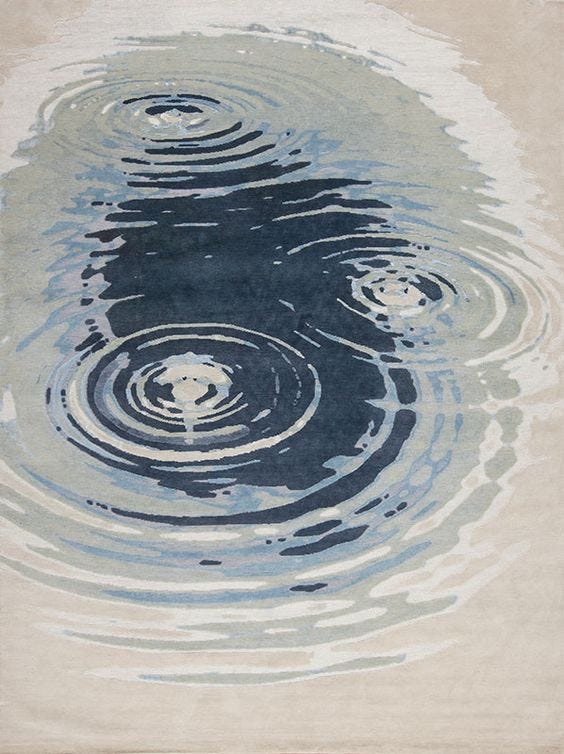

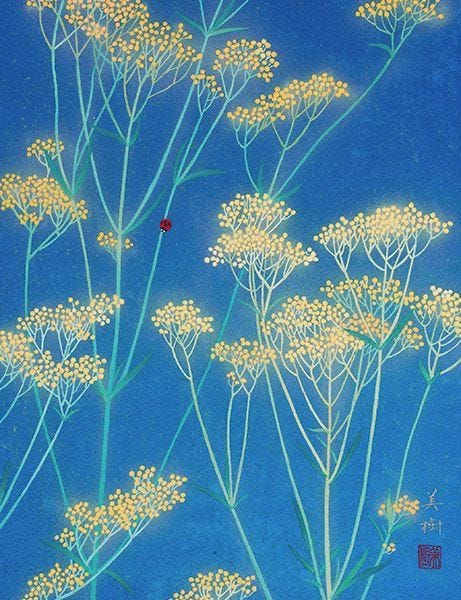
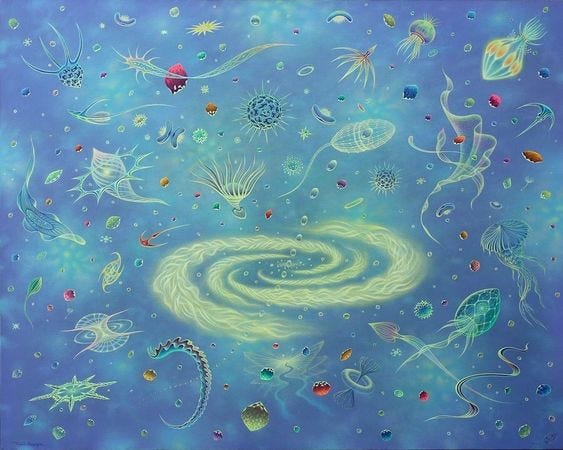
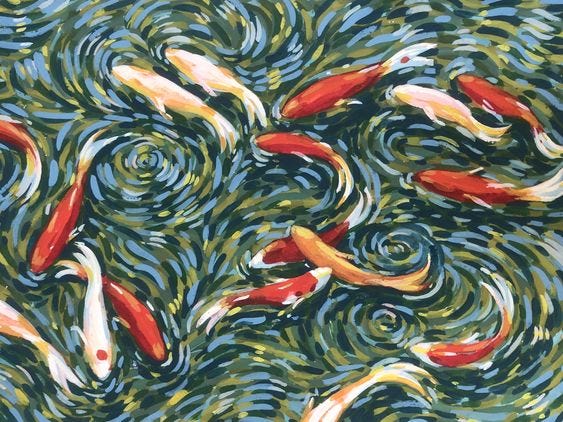

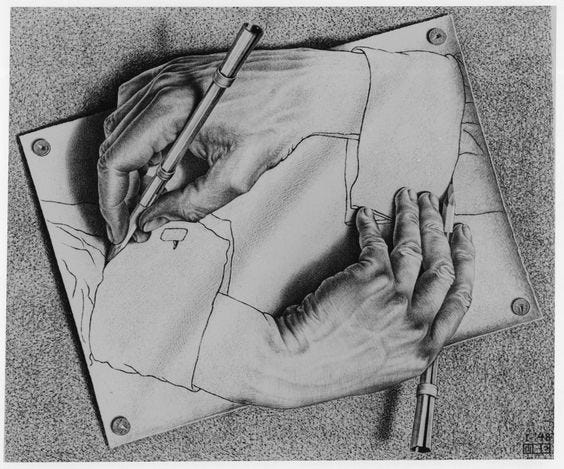
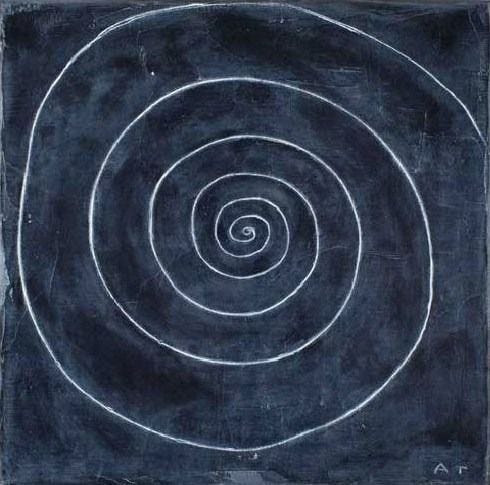


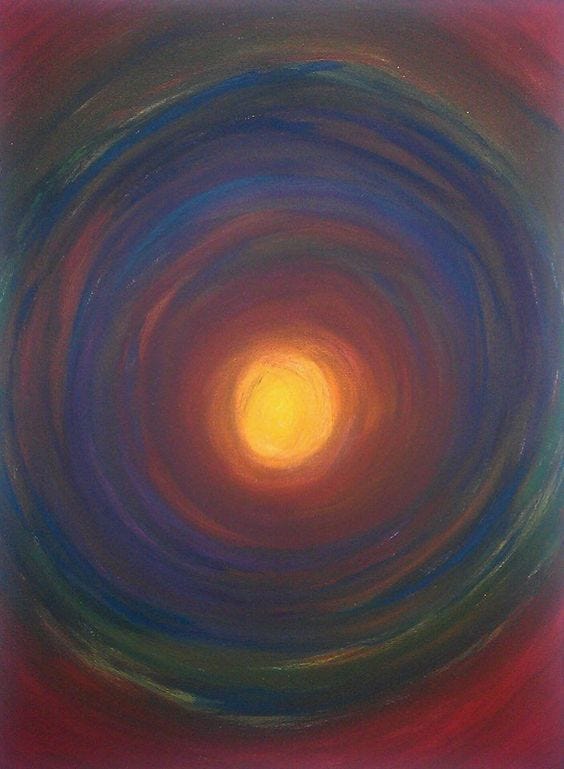



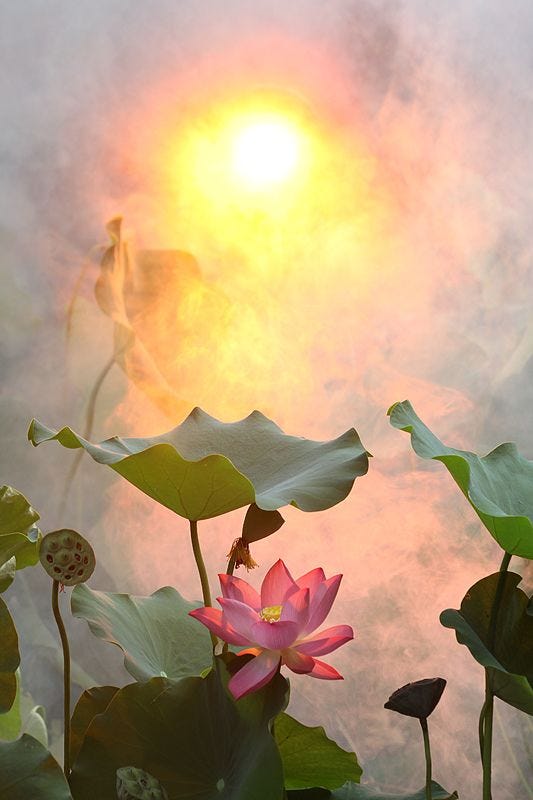


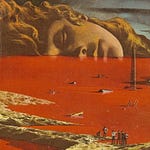

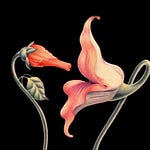


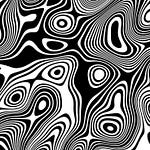
Share this post